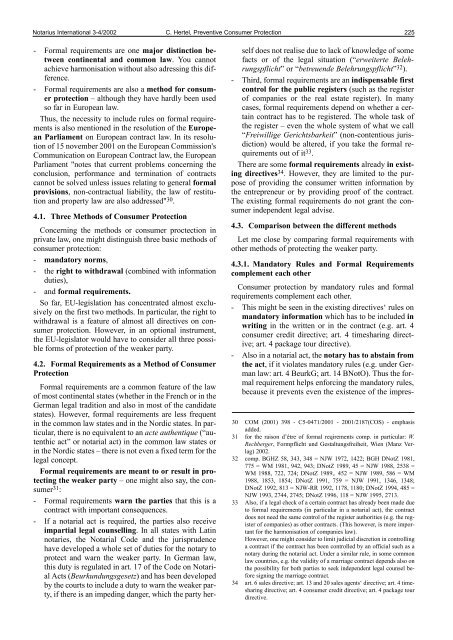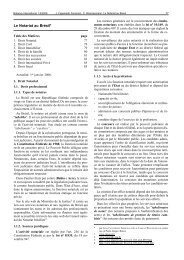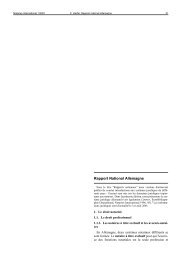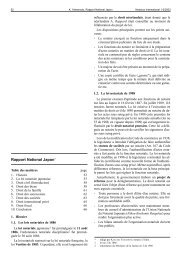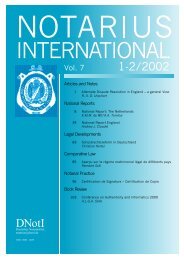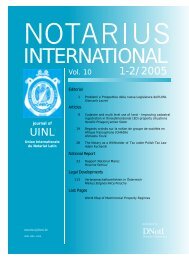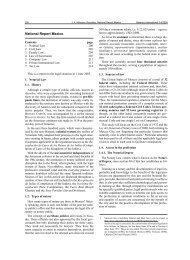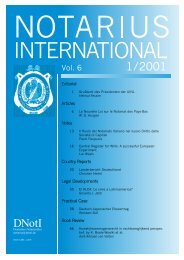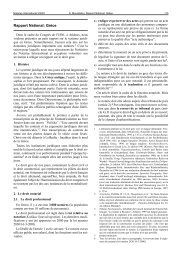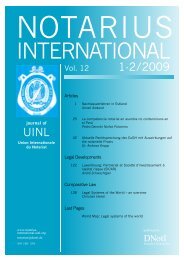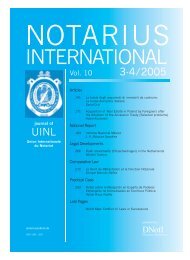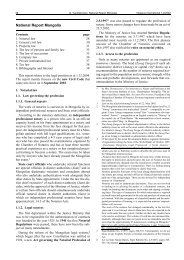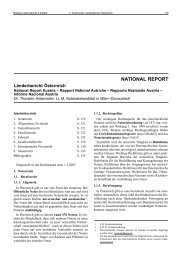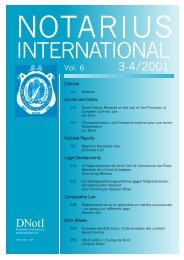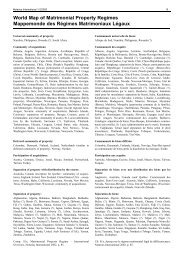ARTICLES and NOTES - Notarius International
ARTICLES and NOTES - Notarius International
ARTICLES and NOTES - Notarius International
Create successful ePaper yourself
Turn your PDF publications into a flip-book with our unique Google optimized e-Paper software.
<strong>Notarius</strong> <strong>International</strong> 3-4/2002 C. Hertel, Preventive Consumer Protection 225<br />
- Formal requirements are one major distinction between<br />
continental <strong>and</strong> common law. You cannot<br />
achieve harmonisation without also adressing this difference.<br />
- Formal requirements are also a method for consumer<br />
protection – although they have hardly been used<br />
so far in European law.<br />
Thus, the necessity to include rules on formal requirements<br />
is also mentioned in the resolution of the European<br />
Parliament on European contract law. In its resolution<br />
of 15 november 2001 on the European Commission's<br />
Communication on European Contract law, the European<br />
Parliament "notes that current problems concerning the<br />
conclusion, performance <strong>and</strong> termination of contracts<br />
cannot be solved unless issues relating to general formal<br />
provisions, non-contractual liability, the law of restitution<br />
<strong>and</strong> property law are also addressed" 30 .<br />
4.1. Three Methods of Consumer Protection<br />
Concerning the methods or consumer proctection in<br />
private law, one might distinguish three basic methods of<br />
consumer protection:<br />
- m<strong>and</strong>atory norms,<br />
- the right to withdrawal (combined with information<br />
duties),<br />
- <strong>and</strong> formal requirements.<br />
So far, EU-legislation has concentrated almost exclusively<br />
on the first two methods. In particular, the right to<br />
withdrawal is a feature of almost all directives on consumer<br />
protection. However, in an optional instrument,<br />
the EU-legislator would have to consider all three possible<br />
forms of protection of the weaker party.<br />
4.2. Formal Requirements as a Method of Consumer<br />
Protection<br />
Formal requirements are a common feature of the law<br />
of most continental states (whether in the French or in the<br />
German legal tradition <strong>and</strong> also in most of the c<strong>and</strong>idate<br />
states). However, formal requirements are less frequent<br />
in the common law states <strong>and</strong> in the Nordic states. In particular,<br />
there is no equivalent to an acte authentique (“autenthic<br />
act” or notarial act) in the common law states or<br />
in the Nordic states – there is not even a fixed term for the<br />
legal concept.<br />
Formal requirements are meant to or result in protecting<br />
the weaker party – one might also say, the consumer<br />
31 :<br />
- Formal requirements warn the parties that this is a<br />
contract with important consequences.<br />
- If a notarial act is required, the parties also receive<br />
impartial legal counselling. In all states with Latin<br />
notaries, the Notarial Code <strong>and</strong> the jurisprudence<br />
have developed a whole set of duties for the notary to<br />
protect <strong>and</strong> warn the weaker party. In German law,<br />
this duty is regulated in art. 17 of the Code on Notarial<br />
Acts (Beurkundungsgesetz) <strong>and</strong> has been developed<br />
by the courts to include a duty to warn the weaker party,<br />
if there is an impeding danger, which the party herself<br />
does not realise due to lack of knowledge of some<br />
facts or of the legal situation (“erweiterte Belehrungspflicht”<br />
or “betreuende Belehrungspflicht” 32 ).<br />
- Third, formal requirements are an indispensable first<br />
control for the public registers (such as the register<br />
of companies or the real estate register). In many<br />
cases, formal requirements depend on whether a certain<br />
contract has to be registered. The whole task of<br />
the register – even the whole system of what we call<br />
“Freiwillige Gerichtsbarkeit” (non-contentious jurisdiction)<br />
would be altered, if you take the formal requirements<br />
out of it 33 .<br />
There are some formal requirements already in existing<br />
directives 34 . However, they are limited to the purpose<br />
of providing the consumer written information by<br />
the entrepreneur or by providing proof of the contract.<br />
The existing formal requirements do not grant the consumer<br />
independent legal advise.<br />
4.3. Comparison between the different methods<br />
Let me close by comparing formal requirements with<br />
other methods of protecting the weaker party.<br />
4.3.1. M<strong>and</strong>atory Rules <strong>and</strong> Formal Requirements<br />
complement each other<br />
Consumer protection by m<strong>and</strong>atory rules <strong>and</strong> formal<br />
requirements complement each other.<br />
- This might be seen in the existing directives‘ rules on<br />
m<strong>and</strong>atory information which has to be included in<br />
writing in the written or in the contract (e.g. art. 4<br />
consumer credit directive; art. 4 timesharing directive;<br />
art. 4 package tour directive).<br />
- Also in a notarial act, the notary has to abstain from<br />
the act, if it violates m<strong>and</strong>atory rules (e.g. under German<br />
law: art. 4 BeurkG; art. 14 BNotO). Thus the formal<br />
requirement helps enforcing the m<strong>and</strong>atory rules,<br />
because it prevents even the existence of the impres-<br />
30 COM (2001) 398 - C5-0471/2001 - 2001/2187(COS) - emphasis<br />
added.<br />
31 for the raison d’être of formal reqirements comp. in particular: W.<br />
Rechberger, Formpflicht und Gestaltungsfreiheit, Wien (Manz Verlag)<br />
2002.<br />
32 comp. BGHZ 58, 343, 348 = NJW 1972, 1422; BGH DNotZ 1981,<br />
775 = WM 1981, 942, 943; DNotZ 1989, 45 = NJW 1988, 2538 =<br />
WM 1988, 722, 724; DNotZ 1989,. 452 = NJW 1989, 586 = WM<br />
1988, 1853, 1854; DNotZ 1991, 759 = NJW 1991, 1346, 1348;<br />
DNotZ 1992, 813 = NJW-RR 1992, 1178, 1180; DNotZ 1994, 485 =<br />
NJW 1993, 2744, 2745; DNotZ 1996, 118 = NJW 1995, 2713.<br />
33 Also, if a legal check of a certain contract has already been made due<br />
to formal requirements (in particular in a notarial act), the contract<br />
does not need the same control of the register authorities (e.g. the register<br />
of companies) as other contracts. (This however, is more important<br />
for the harmonisation of companies law).<br />
However, one might consider to limit judicial discretion in controlling<br />
a contract if the contract has been controlled by an official such as a<br />
notary during the notarial act. Under a similar rule, in some common<br />
law countries, e.g. the validity of a marriage contract depends also on<br />
the possibility for both parties to seek independent legal counsel before<br />
signing the marriage contract.<br />
34 art. 6 sales directive; art. 13 <strong>and</strong> 20 sales agents‘ directive; art. 4 timesharing<br />
directive; art. 4 consumer credit directive; art. 4 package tour<br />
directive.


